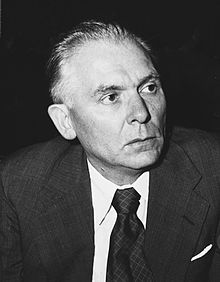Imre Horváth
Imre Horváth (born November 19, 1901 in Budapest , Austria-Hungary ; † February 3, 1958 ibid) was a Hungarian diplomat and politician of the Hungarian Communist Party MKP (Magyar Kommunista Párt) , the party of the Hungarian working people MDP (Magyar Dolgozók Pártja) and later the Hungarian Socialist Workers' Party MSZMP (Magyar Szocialista Munkáspárt) , who was ambassador in various states and temporarily foreign minister.
Life
Communist functionary, arrests and World War II
Horváth, who came from a working-class family, worked as a laborer in a telephone factory after attending school and in 1916 completed a training course organized by the educational group of the Hungarian Social Democratic Party MSZDP (Magyarországi Szociáldemokrata Párt) . On November 24, 1919 he was one of the founding members of the Hungarian Communist Party (Kommunisták Magyarországi Pártja) and was trained as a political commissar by the People's Commissariat for Internal Affairs of the Soviet Union and subsequently accepted as a political commissar of the 53rd Infantry Regiment and the 46th Infantry Regiment participated in various campaigns. He was arrested in August 1919 and was held in an internment camp until 1920.
After his release, Horváth was initially significantly involved in the reorganization of the illegal KMP in the Kingdom of Hungary , but was arrested again in the spring of 1921 and sentenced to ten years in prison. As part of a prisoner exchange, he traveled to the Soviet Union in the spring of 1922 and was initially employed there as a worker in a machine factory before he became a librarian at the Marx - Engels Institute in 1926 and then between 1928 and 1929 worked at the Moscow Geodesy Institute .
In 1933 Horváth was ordered back to Hungary by his party, where he was arrested again in November 1934 and spent the next ten years in the Stern prison (Csillagbörtönben) in Szeged . After the occupation of Hungary by Germany as part of the Margarethe company during World War II , he was taken to the Dachau concentration camp .
Political career in the post-war period and in the People's Republic of Hungary
After his return to Hungary in October 1945, Horváth was taken on as a diplomat in the foreign service and was first secretary and later counselor at the embassy in the Soviet Union. Subsequently, between May 1948 and September 1949, he was a representative of the Hungarian government at the Soviet Military Administration in Germany (SMAD) in Berlin .
After various posts in the Foreign Ministry, Horváth was Ambassador to the USA in September 1951 and then Ambassador to Great Britain in September 1953 , before he was Ambassador to Czechoslovakia between April 1954 and June 1956 .
After his return, Horváth was first President of the Institute for Cultural Relations in June 1956, but on July 30, 1956, he succeeded János Boldóczki as Foreign Minister. With the exception of a brief interruption, he held this ministerial office from November 1st to 4th, 1956 when Imre Nagy was Foreign Minister, until his death. He was also a member of the Central Committee (ZK) of the MSZMP from November 1956 until his death .
Web links
- Entry in Történelmi Tár (Hungarian)
- Hungary: Key Ministries (rulers.org)
| personal data | |
|---|---|
| SURNAME | Horváth, Imre |
| BRIEF DESCRIPTION | Hungarian communist politician |
| DATE OF BIRTH | November 19, 1901 |
| PLACE OF BIRTH | Budapest |
| DATE OF DEATH | 3rd February 1958 |
| Place of death | Budapest |
